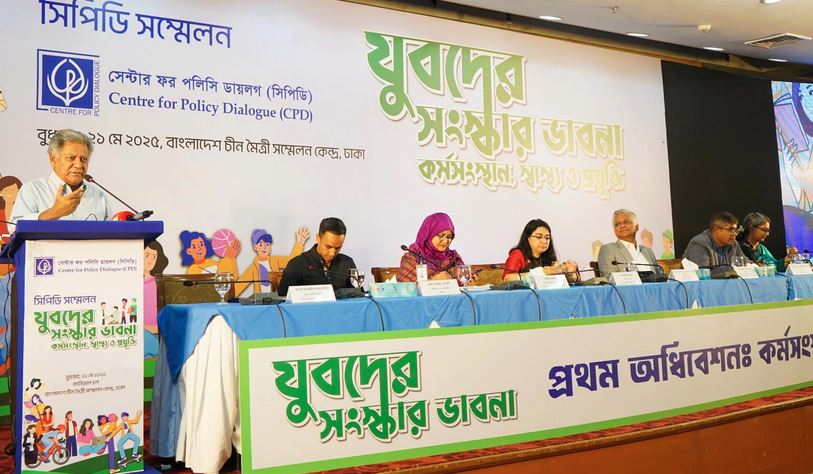
DHAKA, May 21, 2025 (BSS) - The Centre for Policy Dialogue (CPD) has laid emphasis on providing young people with the tools to participate in the digital world for mitigating unemployment, fostering innovation, driving economic growth, and promoting social inclusion.
The private think tank also observed that the broader digital divide must be addressed to ensure benefits for all youth from technology by facilitating digital inclusion for marginalised groups through affordable internet access, digital literacy initiatives, and meaningful opportunities in the digital economy.
CPD made the observation at a conference on “Youth’s Perspectives on Reforms: Employment, Health and Technology” at Bangladesh China Friendship Conference Center (BCFCC) in the city.
Labour and Employment Adviser Brigadier General (retd) Dr M Sakhawat Hossain attended the first session on ‘Youth’s Perspectives on Reforms: Employment and Technology’ as the chief guest while CPD Executive Director Dr Fahmida Khatun presided over it.
CPD Senior Research Associate Foqoruddin Al Kabir delivered the keynote speech.
Founder and Chief Executive Officer of Shikho Shahir Chowdhury, Co-Founder and CEO of the ShareTrip Limited Sadia Haque, CEO of the BD Jobs Limited A K M Fahim Mashroor, spokesperson for the Students Against Discriminations (SAD) Umama Fatima, President of the Leathergoods and Footwear Manufacturers and Exporters Association of Bangladesh (LFMEAB) Syed Nasim Manzur and Member (Registration and Certification) of NSDA Alif Rudaba were the discussants of the session.
CPD Joint Director Dialogue and Outreach Avra Bhattacharjee moderated the open discussion.
In his speech, Sakhawat Hossain urged youth to equip them with the modern technology to take the nation forward through facing all the upcoming challenges.
“Most of the Bangladeshi expatriate workers are not respected in the host countries because they are not exported as skilled workers. So, youth should take technical education,” he added.
Foqoruddin Al Kabir urged the authorities concerned to address the digital gender divide requires removing barriers to connectivity and equipping women and girls with the skills to succeed in the digital age.
He said NSDP was formulated to develop the country’s human capital and align workforce skills with the demands of the rapidly evolving economy.
He said Bangladesh must adopt strategies that capitalise on this demographic resource as the country is currently experiencing a demographic dividend, a critical window of opportunity that is expected to peak in the coming decades.
“At the heart of this opportunity are the youth—key drivers of innovation and progress. One-fourth (1/4)of the country’s total population is in the 15-29 age group. The country’s current youth population is 45.9 million, which is approximately 28% of the total population. The average age of Bangladesh’s population is 27 years (United Nations, Department of Economic and Social Affairs, Population Division, 2022),” he added.